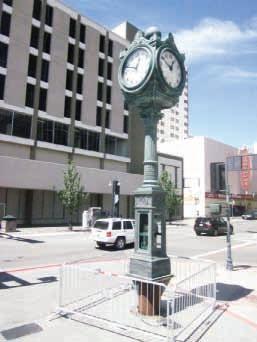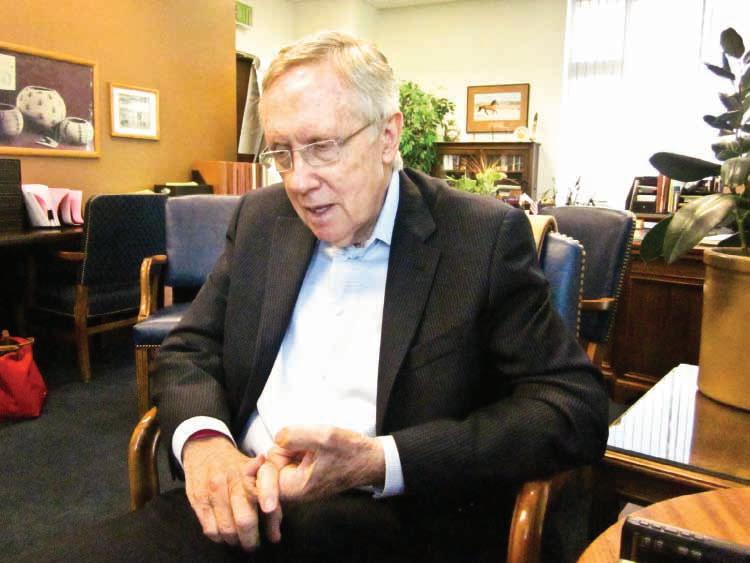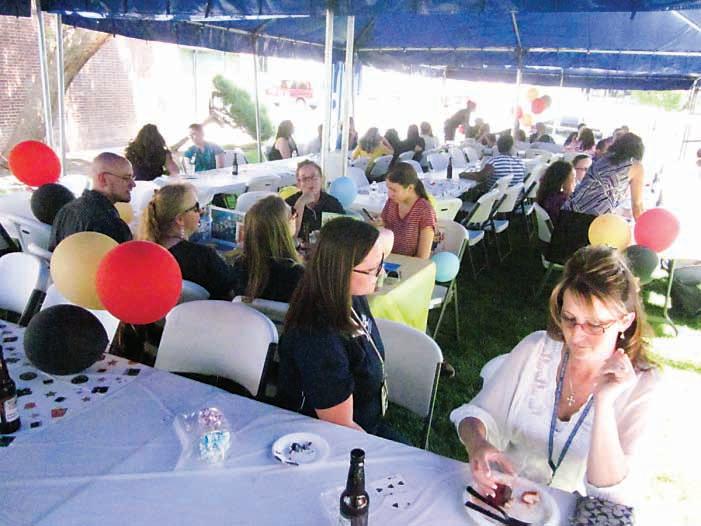
9 minute read
News
from Aug. 29, 2013
Time to go home
A huge pedestal clock has come back to downtown Reno.
Advertisement
The clock, built by the Mayer Company of Seattle and the E. Howard Company of Boston, stood in the downtown in front of Ginsburg Jewelers until the 1960s when Park Lane Mall developer Sonner Greenspan obtained ownership and moved it to Park Lane where it was installed and used as a symbol of the mall in advertising.
When plans to demolish Park Lane were announced, the clock was donated to the city (“Time for preservation,” RN&R, Feb. 14, 2008). It was one of two pedestal clocks that stood in mid-block on Virginia Street between First and Second streets across the street from each other for decades. The other clock was two-sided and its fate is unknown. The Mayer/Howard clock has four faces.
Since the city took ownership, it has been in storage until money could be found to refurbish it. City spokesperson Michelle Anderson said in an email message, “The Cal-Neva Hotel and Casino donated/ offered to pay all the costs associated with the refurbishment, transportation, installation, and insurance necessary” to put the clock back in working order.
The clock has been installed on the southeast corner of Virginia and First as part of the concrete plaza where the Mapes Hotel once stood, half a block south—and on the other side of Virginia—from its historic location.
Sparks has a similar four-faced pedestal clock in place downtown, but it has been nonfunctional for years. Recently it was moved a few dozen feet south.

Interrupted celebration
A demonstration in downtown Reno commemorating the 50th anniversary of the March on Washington for Jobs and Freedom left some hard feelings.
According to complaints filed afterward, the Reno event was permitted for 10 a.m. to noon on Aug. 24 at the federal building at Liberty and Virginia downtown. People arriving early found no noise or maintenance going on, but at 10 a.m., weed whacking and lawn mowing began. Local NAACP president Lonnie Feemster said, “I witnessed the individual who was reckless and rude in his behavior as he threw one of the event signs and banner for the NAACP on the ground and then walked on them. The loud noise made it impossible to talk to him, and he was using a potentially dangerous device within a few inches of people, including young children.”
Participant Jake Highton wrote, “In the 45 minutes or so that I was there not one soul came in the building. Then, in what I think was deliberate harassment, the lawn mower roared by us and interrupted the demonstration.”
Maybe the smoke’s getting to them
The service counter at the Washoe Air Quality Division began closing half an hour early—that is, at 4:30 p.m.—on Aug. 26. A county release said the early closing was to help office workers use “the last half hour of the day to complete customer service activities and reconcile finances and deposits.” —Dennis Myers
U.S. Sen. Harry Reid talks about going around the state legislatures to create bi-state gambling markets.
Jersey/Nevada nuptials?
Two states consider a joint online gambling market
Reuters last week reported that gambling executives and state casino regulators by are discussing a New Jersey/Nevada Dennis Myers internet gambling compact because they believe Nevada alone cannot sustain a large enough online market. The news service reported that its supporters want it to happen in 2014, but the Nevada Legislature does not meet again until February 2015. The news shot through the gambling world on websites like Casino.org and PokerNews.com, and even was reported around the world (“Un partage des liquidités entre le Nevada et le New Jersey dès 2014?”; “États-Unis: la perspective d’un partage des liquidités entre Nevada et New Jersey de plus en plus sérieuse”). But very few of the reports advanced the story beyond the Reuters piece.
U.S. Sen. Harry Reid senate Democratic leader
Nevada gambling regulators are involved but state legislators appear not to be. Asked if the Senate Judiciary Committee he chairs would handle legislation related to such a compact and whether he has been brought into the process, Clark County Sen. Tick Segerblom said, “It would and I haven’t.”
But U.S. Sen. Harry Reid suggested the two state legislatures may not be needed.
“Maybe they’ll get some federal legislation to allow them to do that before then,” Reid said.
He said he has entertained the notion of compacts for some time.
“We’ve always—we have talked for some time now about compacts. … And if we’re able to get something done—and you know, we’ve worked hard to get that done—that’s something that we would certainly consider, legislatively.”
Asked if he has been in discussions with casino executives or state regulators, he said, “Oh, with the casino executives, of course, but I haven’t talked to any of the regulators. I personally haven’t. My staff may have, but I haven’t. But I’ve talked to casino executives for years now. Not as much the casino executives as people they’ve hired to represent them.”
Three states—Delaware, New Jersey and Nevada—have made online gambling legal and Nevada was first off the mark of having it actually in business, though only those physically present in the state can play. The first legal hand of online poker was dealt on April 30. Who’s on first?
The Reuters story suggested a rapid move to a compact, so much so that one public relations firm put out a news release headed “Online Poker Agreement Nearing Completion.”
While Reuters quoted MGM exec Jim Murren and Nevada gambling regulator Andrew Burnett as being positive on the notion of a bistate compact, New Jersey regulator David Rebuck said, “New Jersey is currently focused on working with its existing casinos to attain successful internet gaming opportunities in this state,” and that he expects “future opportunities for growth and development with other jurisdictions.”
That was interpreted by some websites that regularly cover gambling as meaning that New Jersey believes “it is not yet the right time to forge an agreement of that nature,” as Poker News Report put it.
Asked if the two states would have to consent to joining a bi-state compact, Reid said, “No, not if we pass a federal law.”
Reminded that the two state legislatures had given their consent to the bi-state Lake Tahoe governing compact, Reid said that “would be different,” but was vague on why, other than to repeat that backers of a compact “may not need that in whatever we do here, federally.”
In 1967, state legislators from California and Nevada, and California Gov. Ronald Reagan and Nevada Gov. Paul Laxalt reached an agreement on a bi-state governing compact for the Lake Tahoe Basin. It was approved by the California Legislature in July 1968 and by the Nevada Legislature in February 1969, before Congress took it up and ratified it later that year. It created the Tahoe Regional Planning Agency (TRPA).
After the Reagan/Laxalt compact failed to solve the problem of environmental degradation at the lake, state legislators from both states negotiated reforms that California Gov. Jerry Brown and Nevada Gov. Robert List took to their state legislatures for approval in 1980, after which Congress approved the changes in the compact.
Former state senator and TRPA board member Coe Swobe, who worked on creating the original bi-state Lake Tahoe compact, said action by the legislatures was always a part of the process—and so was the participation of local governments because as the state negotiators worked, they discovered local government issues that needed to be dealt with.
“An interstate compact is a compact between two states and then approved by Congress,” he said. “You couldn’t do it without the legislatures. … We started out with a partnership [between the states]. And we found


that planning, zoning, traffic, local matters had to be resolved.”
He added, “It seems to me that the legislature must act if you are going to have an enforceable agreement. There are these voluntary compacts in some states, but I don’t know how well they work.” The italics represent emphasis in Swobe’s voice.
New Jersey State Sen. Raymond Lesniak, the leading proponent of online gambling in that state, was quoted by CardPlayer.com saying, “Combining our markets would be a good idea. I think we could make it work.”
At opposite ends of the state, two major markets—New York City in the northeast and Philadelphia at west central—are perched right on New Jersey’s borders.


The spread
Meanwhile, legislation moves forward in other jurisdictions to join the online gambling club. In California, the San Manuel Band of Mission Indians near San Bernadino, produced legislation late in the legislative session to legalize online poker. It is sponsored by Sen. Lou Correa, a frequent supporter of tribal gambling. Legislative leaders say it faces an uphill battle so late in the session.
In the Bahamas, the Baha Mar Casino & Hotel is agitating for legal online gambling to address an economic downturn.
Legislation to address the problems of online gambling, however, is not happening as fast as the spread of such gambling. The ease of access to online gambling presents new dangers to addicted gamblers and programs to meet the challenge are far down on legislative lists of things to do.
“The idea of being able to roll out of bed at midnight feeling like playing blackjack—and you can just click on the internet and be able to—is a little scary,” New Jersey Council on Compulsive Gambling of New Jersey assistant director Jeff Beck—himself a recovering addict—told the South Jersey Times. “The idea you can be on drugs and alcohol and not aware of what you’re doing is a little scary.”
Nevada, which did not even have a program for addicts until 2003, has cut its funding while approving new ways to gamble.
Coe Swobe Former state senator
Thanks, folks
N I G H T C L U B
END SUMMER WITH A BANG
LABOR DAY WEEKEND
AUGUST 30
LIVE PERFORMANCE BY DJ FELLI FEL
DJ CRISCO KIDD DJ KEENAN
AUGUST 31
SPECIAL GUEST THE SITUATION MICHAEL SORRENTINO
DJ RICK GEE DJ SN1 DOORS OPEN AT 11PM
SEPTEMBER 1 LIVE PERFORMANCE BY HIP HOP ROYALTY ROB BASE
DJ RAY STYLES DJ MIND MOTION


On the lawn of the Washoe County Court House, county workers were given an appreciation lunch, along with games and other activities. When it was over, they went to their offices and their more customary encounters with often less appreciative members of the public.

CELEBRITY SATURDAYS
SEPTEMBER 28
DOORS OPEN 10:30PM
#PeekTahoe DJPAULYD.COM
TWITTER.COM/DJPAULYD FACEBOOK.COM/DJPAULYD
Must be 21 to enter. Management reserves the right to change or discontinue this offer without notice. Restrictions apply. Must be 21 or older to gamble. Know When To Stop Before You Start.® Gambling Problem? Call 1-800-522-4700. ©2013, Caesars License Company, LLC. T1600-13-143










